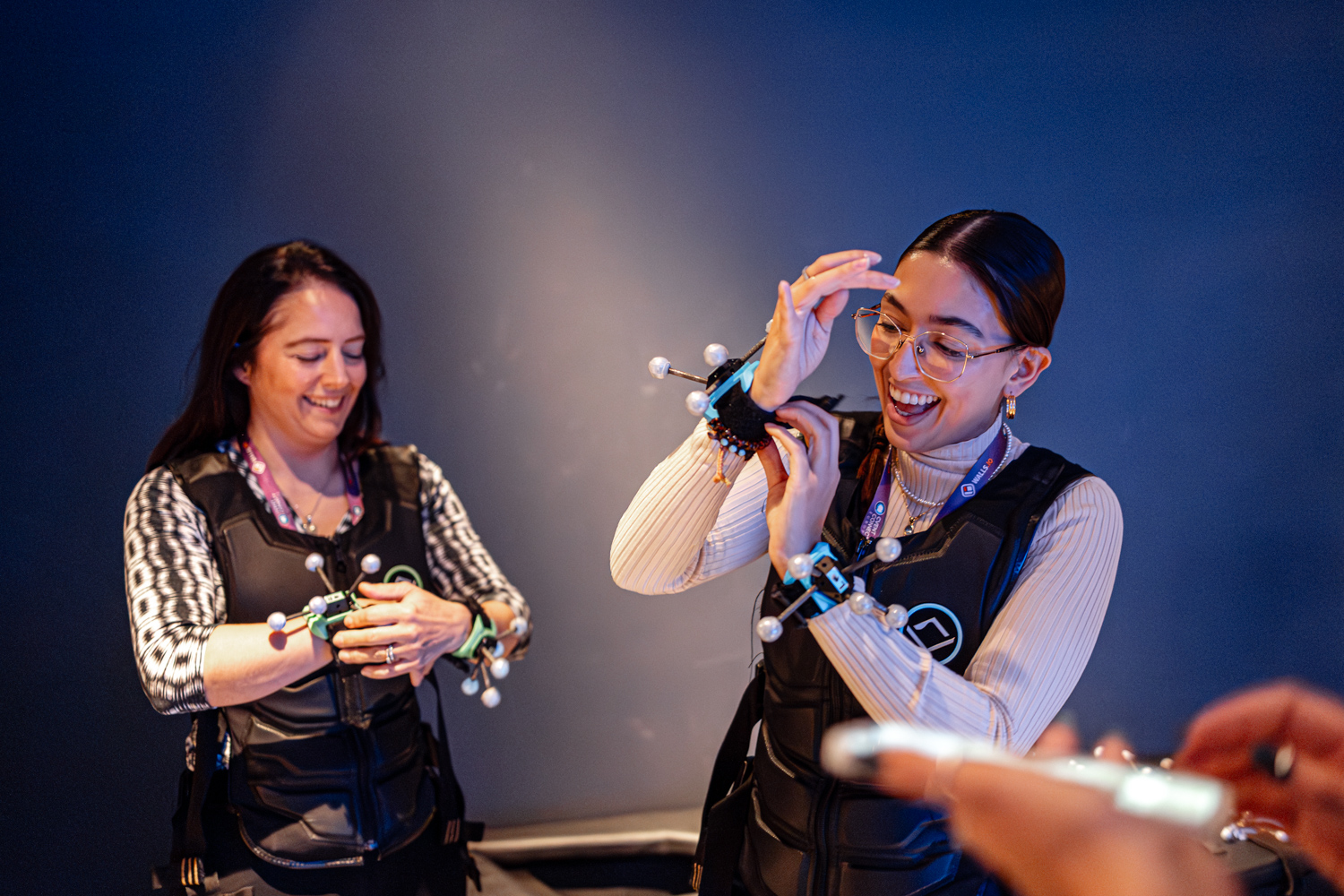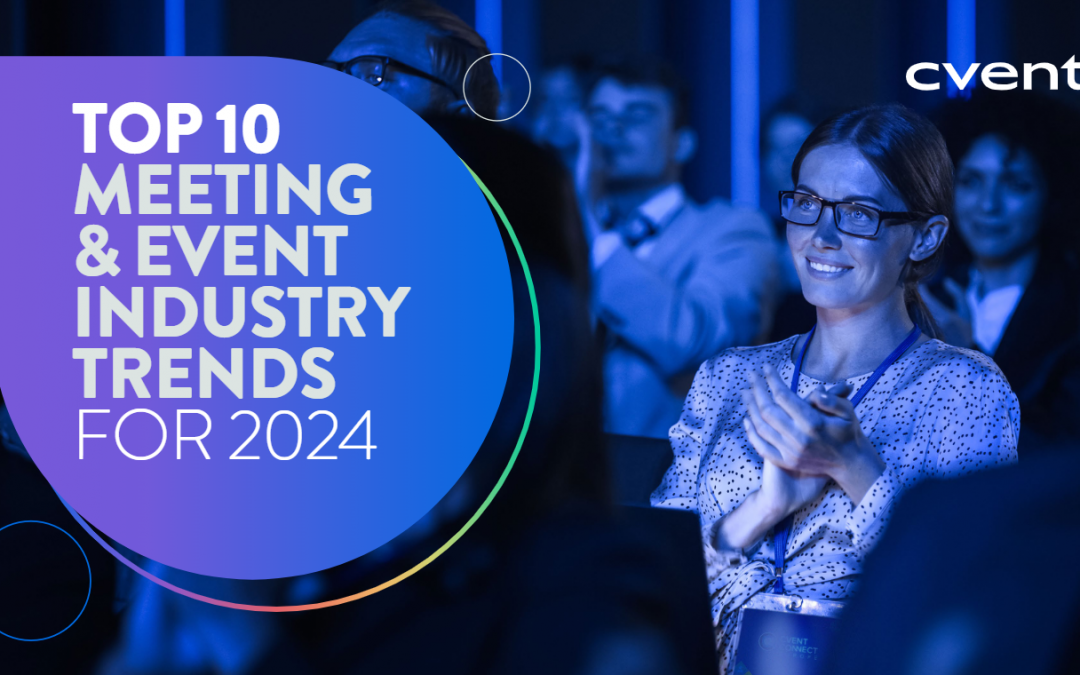“2024 promises to be a golden period for the meetings and events industry,” predicts Cvent.
Planners, marketers, and hospitality professionals have become a collaborative force. Together, their combined expertise is helping to deliver more engaging, year-round experiences that are both carbon-conscious and accessible to all. Technology is playing its part, too. Generative AI had its breakthrough year in 2023, with tools such as ChatGPT being used more widely for ideation and crafting content for emails, websites, and RFPs. We’ve also seen a greater focus on automation and tech consolidation to improve efficiencies and make work lives easier.
Of course, there are always challenges. Costs continue to rise faster than budgets, and contingency planning has become the new norm in an increasingly uncertain world. But with more ways to reach and engage audiences, a greater focus on inclusive and sustainable event design, and the continued evolution of AI-powered solutions, there are exciting opportunities on the horizon.
Drawing on extensive industry research, Cvent data, and interviews, this report reveals the key trends shaping the meetings and events industry in 2024. Whether you’re an event or hospitality professional, read on to discover how you can shape your event programmes, attract more business to your venue or hotel, and future-proof your strategies.
Trend 1: In-person Dominates; Virtual Remains
Undoubtedly, in-person events will continue to anchor the event and hospitality industry in 2024, but virtual experiences are here to stay.
Embracing a Multi-Format Event Mix
A survey conducted among our 21,000+ customers towards the end of 2023 revealed that 74% were planning in-person-only events this year, while 26% will include either virtual events or a mix of in-person and virtual events as part of their 2024 event programme.
Face-to-face experiences offer unique opportunities for deeper engagement, building brand trust, peer-to-peer networking, and developing relationships. On the other hand, virtual events can help to connect more disparate workforces and expand the reach of an event far beyond the walls of a meeting room or conference theatre.
As planners worldwide strive to reduce the carbon footprint of their events and provide additional opportunities for sponsors and exhibitors to showcase their products online, the demand for events that offer a blended programme of virtual and in-person content will strengthen.
Developing blended experiences and engaging audiences year-round through on-demand sessions, webinars, and other engaging content will help foster loyal and engaged communities and keep diverse audiences connected.
Trend 2: Venues Support Experience-First Events
Planners are striving to find venues that can deliver extraordinary experiences and captivate attendees. The race is on to create that all-important ‘wow’ factor and provide one-of-a-kind experiences that cater to attendees’ changing expectations.
Unique Venues See a Surge in Popularity
To meet these demands, planners are prioritising experience-first event design, valuing uniqueness over traditional notions of extravagance. In their quest for bespoke experiences, planners are turning towards unconventional venues in locations that provide a unique aesthetic. These venues offer more flexible pricing and freedom to transform their event space and bring their vision to life. They also serve as a blank canvas for creativity and allow for the creation of more personalised events.
In 2024 and beyond, all venues will look to capitalise on the concept of ‘bleisure travel’, where business travellers incorporate leisure experiences with their work trips, and leisure travellers combine working remotely with wanderlust. For venues, this presents a new revenue opportunity while continuing to provide planners with the facilities, technology, and exclusive offers to create memorable events.
By embracing the shift towards experience-first events and offering unique experiences, venues can position themselves as highly sought-after partners.
Trend 3: AI Experimentation Grows
At a time when teams are being required to do more with less, AI can empower professionals to achieve more with fewer resources and free up time for more creative and strategic endeavours.
For example, AI-driven chatbots can provide quick responses to frequently asked questions. Generative AI tools expedite the creation of copy for campaign emails, event websites, session descriptions, and RFPs for sourcing venues, with the ability to adapt the writing style to suit specific needs.
Meanwhile, AI-powered matchmaking and content recommendation tools are enhancing the attendee experience. These tools analyse profiles and interests, providing personalised suggestions for networking connections and session recommendations.
The potential of AI to mine and analyse the vast amount of data generated by event marketing campaigns, registration, surveys and event apps is invaluable. Although it’s also worth remembering that AI is a tool and not a replacement for the expertise and skills of event, marketing, and hospitality professionals.

Trend 4: Reimagining Engagement
Attendees today expect more from their event experience. In return for the time and effort of attending a meeting or event, they want to be fully immersed in the content and overall experience, making every moment count. Planners and venues must prioritise the audience and their desired outcomes and find creative new ways to engage their senses, evoke positive emotions, and facilitate meaningful connections.
By embracing innovative approaches to engagement and leveraging technology to track and measure engagement, event and marketing professionals can create transformative experiences that leave a lasting impact on attendees. The future of engagement is about connecting with your audience, immersing them in meaningful experiences, and building communities that thrive long after the event.
Trend 5: Technology Unites Planners and Venues
One of the key areas where technology has united venues and event teams is venue sourcing. Armed with a wealth of data, planners can make informed decisions and choose the most suitable venues for their events.
Rebuilding relationships between planners, venues, and suppliers has been a challenge in recent years due to staffing turnovers and other factors. However, technology such as 3D diagramming can play a pivotal role in offering seamless communication and strengthening these relationships.
Trend 6: Accessible, Sustainable Events Reflect Brand Values
Events are a clear way for brands to showcase their values in these areas and show they are practising what they preach.
Accessibility
Globally, around one in six people have some form of disability. In the US, it’s around 27% of adults;4 in the UK it’s around 24% of the population, and across the EU it’s approximately one in four adults. Accessibility is a fundamental aspect of event planning and prioritising it from the outset means that meetings and events are inclusive for everyone. From your registration process through the to the width of your aisles, from captioning to wellness spaces, it’s important to think about accessibility at every step of the way.
Sustainability
As organisations strive to meet Net Zero targets by 2030 and face increasing pressure to reduce their carbon footprint, events play a crucial role in promoting sustainability. To embrace sustainability in events consider greener design, carbon-conscious menu choices, eliminating single-use plastics and prioritising sustainable venues.
Trend 7: Events Shift to Marketing
There has been a significant shift in the corporate landscape, with in-house event teams increasingly reporting to marketing. In fact, a majority (71%) of corporate in-house events teams are now housed within a company’s marketing function, marking a substantial rise from the 55% reported in 2022.
Closer collaboration between event and marketing teams will mean more cohesive and impactful brand experiences and efforts to align marketing goals and event objectives. Plus, as marketing and event planning align ever closer, we’ll see marketing teams have their input when it comes to sourcing venues that match overall campaign objectives. Venues will need to consider this new client customer when promoting their services and offers.
This greater synergy between planners and marketers ultimately puts the spotlight on events as a critical channel for 2024 and beyond. Together, event teams and marketers are a more formidable force to drive impact and objectives across the organisation.

Trend 8: Technology Becomes a Core Skill
As we look to 2024, it’s clear that technology will continue to evolve and play a significant role in marketing, event design, and audience engagement. To ensure career progression, professionals in the industry must continue to develop their skills in areas such as AI, data analysis and insights, event management software and sales and marketing automation.
Trend 9: Cost Pressure Place a Premium on ROI
Event budgets are on the rise, but this isn’t necessarily enough to match inflationary rises in costs. As a result, planners are still left with the task of doing more with less, requiring them to negotiate diligently with venues and suppliers to secure the best deals.
Planners share a common concern: the increasing expenses associated with venues, catering, transportation, and services.
Trend 10: Centralising for Scale
Just as organisations have centralised their CRM and marketing technologies, many also recognise the value of centralising their event technology. Centralisation enables organisations to scale their event programs effectively, gain a unified source of truth for data, and demonstrate the impact of their events.



